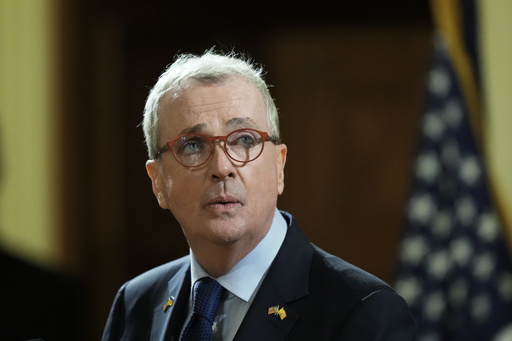In Trenton, New Jersey, Governor Phil Murphy has presented his final budget plan for the state as he concludes his two-term tenure in office. This spending proposal, amounting to nearly $58.1 billion, is aimed at increasing investment in education and public transportation. However, the uncertain status of federal funding could potentially disrupt these financial plans.
During an address to a joint session of the Democratic-majority Legislature, Murphy positioned the budget as a key achievement stemming from his campaign pledges. This includes meeting commitments to fully fund state worker pensions and consistently elevate K-12 education spending. Additionally, the budget allocates new tax revenue to support New Jersey Transit, which has long been financially constrained.
“Though we have come far in this journey, let me be absolutely clear: We have not reached the finish line yet,” Murphy mentioned, acknowledging the turbulent political climate in Washington. He proposed reserving over $6 billion as a surplus to cushion the state against potential unforeseen challenges, emphasizing the ongoing priority of economic security for New Jersey residents.
The budget’s backdrop is marked by a federal funding stalemate, amplified by congressional debates on spending, which cast doubt over future plans. Particularly at risk is the $27.5 billion federal assistance for initiatives like the Medicaid program, which serves low-income individuals, as highlighted by State Treasurer Elizabeth Muoio. She noted the looming possibility of significant federal cuts and the uncertainty it brings to the state’s fiscal planning.
Murphy’s current budget increases spending by approximately 3.8% from last year’s proposal. However, the actual new spending figure is slightly lower than what was approved for the current fiscal year due to legislative amendments and additional expenses. The legislative body is now tasked with reviewing and passing a balanced budget by July 1, as required by state constitutional mandates.
Adding to the complexity, New Jersey faces possible declines in some of its revenue streams, including corporate taxes. This occurs against a backdrop of Republican criticism over the state’s growing budget, which has expanded significantly since Murphy’s initial proposal of $37.4 billion in 2018. Murphy has been transparent about his progressive policies throughout his tenure, including tax reform—raising taxes on millionaires, allowing business tax cuts to lapse, and introducing new taxes such as a 2.5% transit fee on large companies.
Education funding under Murphy has experienced considerable growth, increasing from approximately $8 billion annually under previous Governor Chris Christie to $12 billion in Murphy’s 2026 fiscal proposal. If adopted, this budget would secure a $6.3 billion surplus, a stark increase from the $500 million fund Murphy inherited.
Additionally, there have been commitments to property tax relief. However, without assured funding sources, it’s uncertain if these benefits will sustain into future administrations. This is particularly relevant in New Jersey, known for its high property tax rates nationwide.




